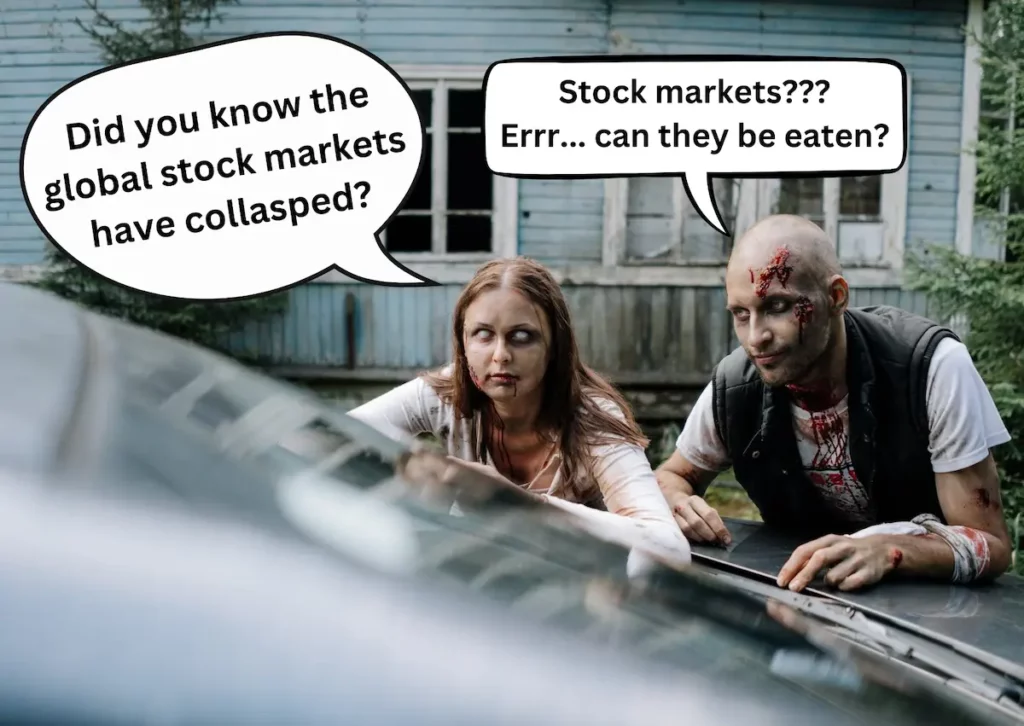Let’s start with a short tale about a small fish from a small pond. It goes something like this:
There once lived a small fish in a small pond. The small pond was just next to the massive sea, separated by narrow barriers of land. If the small fish wanted to, he could with some effort leap from the small pond into the neighbouring sea.
But of course he didn’t. Why would he? The small pond was home and he felt safe and secure. Even when the weather got nasty and the waves crashed against the rocky barriers with a vengeance, the small pond and its inhabitants remained isolated from the chaos. The small fish had absolutely no intention of leaving his safe zone. No way.
Then one day, the unthinkable happened. It stopped raining for what seemed an eternity and the sun’s rays beat down mercilessly on that little pond. Mm-hmm… the pond began to dry up!
The small fish started to notice that day after day, he seemed to have less and less water to swim in. He thought: it’s just temporary. Things will get back to normal soon.
However, normal never returned. The pond eventually dried up and the small fish completely missed his golden opportunity to make it out alive while he could.
THE END
Yup, it’s definitely not a Hollywood ending. But… the bright side is, there are valuable investing lessons we can draw from the story.
You may have guessed that the small pond represents home or our safe zone. The sea represents the rest of the world.
So the question is: if you knew that the pond would dry up one day, would you make that leap into the sea or just stay put?

My point is, as investors, it’s understandable that we often start off our investing journey with a home bias. Now there’s absolutely nothing wrong with this. In fact, it’s always a good idea to get your feet wet by investing in what you’re most familiar with — home.
Side note: The term “home bias” does not necessarily refer to your country of residence. I know of many non-US resident investors who only invest in US stocks (not surprising as the US has the largest and most followed stock market in the world). In this case, their “home bias” is the US, not the country they are residing in.
Over time, as you mature as an investor and gain more experience, you may begin to look beyond and see what else is out there.
For Mrs Wow and I, we eventually decided to take that leap from our small pond into the sea. So here’s the story of why we decided to invest in global index funds.
- If You Can’t Predict, Prepare by Diversifying
- It’s Never Been Easier to Invest in Global Equities
- A Boring Portfolio is Perfect When You are Retired
1. If You Can’t Predict, Prepare by Diversifying
When Mrs Wow and I began our investment journey, we started by buying stocks and Exchange Traded Funds (ETFs) from our domestic market, i.e. Singapore.
For the uninitiated: Exchange Traded Funds or ETFs are like mutual funds which contain a basket of stocks. The main difference between an ETF and a mutual fund is when it can be traded and with who. You can buy and sell an ETF any time during market hours on the stock exchange (e.g. NYSE, LSE, SGX) through any broker, whereas a mutual fund can only be bought or sold at the close of each trading day from a specific fund manager (whoever you bought from, e.g. Vanguard, Fidelity, Nikko AM).
So we bought a Straits Times Index ETF (the STI ETF tracks the performance of the 30 largest companies in Singapore), followed by individual dividend stocks that we understand and feel comfortable holding for the long term.
After much research, this led us to invest in all three Singapore banks (DBS, OCBC and UOB) and Singapore Real Estate Investment Trusts (S-REITs) with a solid track record from sponsors like Capitaland, Mapletree and Fraser — all bluechips of the Singapore Exchange (SGX).
However, as we continued to tread into the unknown future, we couldn’t help but think: will the Singapore market always be fine and dandy? What if one day something goes very wrong fundamentally? What if we experience a lost decade (or more) like Japan?
The truth is, although it’s highly unlikely that Singapore’s economy will spiral out of control, no one can say for sure. Nobody has a crystal ball, which is why even economists or financial experts get it wrong. Sometimes way wrong.
When you can’t predict, prepare. And what better way to prepare for the unknown than to alleviate concentration or geographical risk by diversifying your portfolio globally.
Think about it. Historically, we have seen countries and empires rise and fall. Usually when one part of the world is in turmoil, some other part is doing fine (or at least not as bad). But the entire world collapsing all at once?
Even if you were a zombie apocalypse doomsayer, you would probably still agree that a complete worldwide economic collapse though possible is highly improbable. Frankly, if the entire world did experience a catastrophic event, the stock market would be the least of my concern.

Whatever the case, if I had to choose between one country vs the entire world, I would take my chances with the world. I wouldn’t want to be that small fish that didn’t make that leap from his small pond into the sea of opportunity.
Thus began our investment journey beyond our borders.
When you can’t predict, prepare. And what better way to prepare for the unknown than to alleviate concentration or geographical risk by diversifying your portfolio globally.
2. It’s Never Been Easier to Invest in Global Equities
Next, it was homework time. Thank goodness for low-cost all-world index ETFs! It’s never been easier or cheaper to invest in both developed and emerging markets around the world.
Instead of having to plough through hundreds if not thousands of foreign stocks, all we needed to do was to pick the right ETF that tracks a major benchmark such as the FTSE all-world index or MSCI world index.
Check out: Why Index Funds are Perfect for Do-Nothing Investors
Note: If you don’t know the difference between the two major global index providers FTSE and MSCI, I would recommend that you read this article from justETF.com (I’ve inserted the link below)1. It’s also a great place to get yourself acquainted with ETFs.
So what were we looking for exactly? Here was our simple checklist:
✅ It had to be an all-world index tracker without exclusions and preferably with some exposure to emerging markets.
✅ It should be dividend yielding with the prospect for long-term growth.
✅ It has to be an Irish-domiciled ETF (for tax efficiency).
Note: For US-domiciled ETFs, we have to pay a 30% withholding tax on dividends. However, for an Irish-domiciled ETF, the US-Ireland tax treaty reduces that amount down to 15% (no taxes need to be paid between Ireland and Singapore). That’s a reduction of half!
Eventually, we filtered down to these two all-world index ETFs, namely the Vanguard FTSE All-World High Dividend Yield UCITS ETF (stock code: VHYD) and Vanguard FTSE All-World UCITS ETF (stock code: VWRD).

Both ETFs are listed on the London Stock Exchange (LSE) with variants for (1) fund currency in USD or GBP and (2) accumulating or distributing.
From the stock codes, you may have noticed that we opted for USD and distributing. USD was the obvious choice as our home currency is in SGD. Trading in GBP would have just added another unnecessary layer of foreign currency risk for us.
We also went for distributing (where dividends are distributed periodically) instead of accumulating (where dividends are automatically re-invested). This choice wasn’t so apparent at first, but after further digging, we decided on distributing for the following two reasons:
1️⃣ For an Irish-domiciled ETF, there’s no tax incentive if we opted to accumulate instead of distribute. We still get taxed either way.
When dividends get paid out from say a US company, it goes to the Irish-domiciled ETF, incurring the 15% withholding tax there and then. The ETF will subsequently re-invest your after-tax dividends back into the fund on your behalf, saving you a little in fees and commissions, but not taxes.
Note: Domestic tax laws differ from country to country, so make sure you check on yours before investing in an Irish-domiciled ETF.
Do also note that Irish-domiciled ETFs have lower trading volumes compared to US-domiciled ETFs. This doesn’t mean they’re illiquid assets (far from it). It just means they may have a higher bid-ask spread compared to their US counterparts.
This can be treated as a hidden cost of sorts. But if you’re not buying and selling the ETF frequently, and intend to buy and hold for the long term, that little extra you occasionally “pay” for the wider spread becomes less of a concern.
In any case, what is saved on withholding taxes outweighs everything else, including the higher commissions for the LSE compared to US exchanges.
2️⃣ For retirees like us who no longer generate active income, consistently receiving dividends every year goes a long way.
I don’t think I need to expand on this too much. We simply need the passive income to fund our retirement, so a distributing ETF suits us better. What can I say… we love our dividends!
Anyhow, if you’re currently making good active income from your 9-to-5 and have no immediate need for your dividend payouts, it makes more sense to opt for an accumulating ETF. By re-investing your dividends, you’re taking full advantage of the compounding effect to supercharge your portfolio. That’s what I would tell my younger self to do.
Remember, everyone is different — what works for us may not work for you. So do seek help from a licensed financial advisor if necessary.
I would love to cover more about both VHYD and VWRD, such as their composition, tracking error, expense ratio, past performance, pros and cons, etc. But that has to be a topic for another day.
For now, if you would like to find out more about VHYD and VWRD, I would strongly suggest you go straight to Vanguard UK’s website. I’ve placed the links to VHYL2 and VRWL3 (they are the same ETFs, just that the fund currency is in GBP — the last letter is an “L” instead of a “D”) at the end of this article for your further research.
Full disclosure: At the time of writing, Mrs Wow and I are shareholders of both VHYD and VWRD. Other than owning shares in both ETFs, we do not have any affiliation to Vanguard (we just like them). This article is written solely based on our own opinions and experience. It is for educational purposes only and is NOT investment advice.
Check out: How 3 Investors from Different Continents Grow their Wealth
3. A Boring Portfolio is Perfect When You are Retired
Another reason why we decided to invest in an all-world index ETF is because we wanted “boring”. Yes, that’s right, you heard it, we wanted our portfolio to be as boring as it could possibly be.
The thing is, when you’re retired, you want to protect your portfolio from too much volatility.
Think about it. Suppose you had to draw down 4% from your portfolio every year. If your portfolio was consistently growing 4% or more every year, you would be able to preserve your capital indefinitely and probably have more than you ever did in years to come.
Find out: How to Achieve FIRE with the 4% Rule
Now let’s say your portfolio went down by 20% in a year and you had no choice but to still draw down 4%. That means you would have eaten into your capital that year.
Even if the market recovers by 30% the following year, the value of your portfolio would not be back on par. You’ll still be down by 1.2% because your base was reduced. Imagine if this occurs over and over again —you’ll probably run out of money sooner than expected.
The crux of the matter is, if you need to draw down on your portfolio every year, volatility is the enemy. In retirement, the goal is long term sustainability, not exceptional growth. Steady does it.
Check out: Understanding Index Funds: Does the Tortoise Really Win?
So if you’re looking for extraordinary returns in 5 years of less, an all-world index fund is probably not for you. However, if you’re like us and after “boring” with the prospect of a decent compound annual growth rate (CAGR) over the long term, then an all-world index fund may just be your thing.
A word of caution: Though less volatility does often mean less risk when it comes to equities, it doesn’t mean no risk. An all-world index fund is wide open to market risk and price fluctuations like any other stock. Which is why both VYHD and VWRD are rated 6 out of 7 for risk by Vanguard (i.e. it’s very risky). What this entails is: if you’re not prepared to stay invested for the long term (in my book that means 10 years or more), selling your position “prematurely” may result in a loss of capital.
Retired or not, I hope this article has opened your eyes to the possibility of globalising your portfolio to better ride out the ups and downs we constantly face in this uncertain world.
Sources:
- MSCI vs FTSE: Which is the best index provider?: https://www.justetf.com/en/news/etf/msci-vs-ftse-which-etf-provider-is-the-best-index-provider.html
- FTSE All-World High Dividend Yield UCITS ETF (VHYL): https://www.vanguardinvestor.co.uk/investments/vanguard-ftse-all-world-high-dividend-yield-ucits-etf-usd-distributing/overview
- FTSE All-World UCITS ETF (VWRL): https://www.vanguardinvestor.co.uk/investments/vanguard-ftse-all-world-ucits-etf-usd-distributing/overview
You may also like: Dividend Investing Ideas: The Dogs of the Dow Strategy | The Retirement Bucket Strategy Demystified | Tame Your Emotions: Let Your Wealth Compound Uninterrupted

